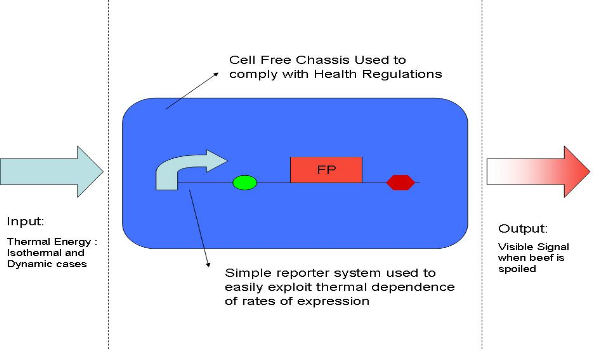Imperial/Cell by Date/Introduction
From 2007.igem.org
| Line 13: | Line 13: | ||
== Motivations == | == Motivations == | ||
| - | The hamburger has become synonymous with modern western culture. We see in fast food chains | + | The hamburger has become synonymous with modern western culture. We see it in fast food chains , ready-made packages in supermarkets, and at most home barbeques - all made using ground beef. But who controls the quality of our burgers, who insures that the burgers we eat don’t spoil the fun and make us sick? |
| - | A lot of work has been carried out to study the spoilage of the beef that make up our burgers | + | ===== Ensuring the Freshness of Beef ===== |
| + | A lot of work has been carried out to study the spoilage of the beef that make up our burgers. In fact, there are professional organisations such as FDA and HACCAP that give strict regulations to ensure the quality of beef that meat industries produce. | ||
| - | + | As consumers, we can see this in our supermarkets in the form of a printed ‘sell by date’, which is based upon challenge testing - a process in which beef is put through numerous temperature scenarios and a prediction then made about how long the beef will last after it has left the factory. Due to safety reservations, this prediction made on printed sell by date often indicates that the beef is off when in may in fact have a few days left. | |
| - | + | On the other hand, survey studies have shown that temperature conditions higher than 10°C are not unusual during transportation, retail storage, and consumer handling of beef products. Such temperature abuses during any stage of the cold chain could result in an unexpected loss of quality and a significant decrease of shelf life. Indeed, printed sell by date labels are seldom the best estimate of meat shelf-life. To this, the meat industry has looked into other ways of prediction and managing the cold chain. | |
| - | With an idea of the problem we are trying to target head on to our specification page where we take the first step in our engineering cycle to ensure the quality, | + | |
| + | ===== Temperature Time Integrators ===== | ||
| + | One particular technology is a family of devices called temperature time integrators (TTIs). These devices try to monitor the thermal exposure of the food. When a certain level of exposure is reached, a change occurs, usually visual, which signals that the beef has gone off. | ||
| + | |||
| + | This project is concerned with the development of a TTI that is based upon synthetic biology components; exploiting the thermal dependence of gene expression of simple reporter system in a cell free extract. | ||
| + | |||
| + | With an idea of the problem we are trying to target head on to our specification page where we take the first step in our engineering cycle to ensure the quality, relevance and robustness of our solution. | ||
| Line 31: | Line 38: | ||
== References == | == References == | ||
| + | |||
| + | |||
Revision as of 17:36, 21 October 2007

Cell By Date:Introduction
Project Summary
Motivations
The hamburger has become synonymous with modern western culture. We see it in fast food chains , ready-made packages in supermarkets, and at most home barbeques - all made using ground beef. But who controls the quality of our burgers, who insures that the burgers we eat don’t spoil the fun and make us sick?
Ensuring the Freshness of Beef
A lot of work has been carried out to study the spoilage of the beef that make up our burgers. In fact, there are professional organisations such as FDA and HACCAP that give strict regulations to ensure the quality of beef that meat industries produce.
As consumers, we can see this in our supermarkets in the form of a printed ‘sell by date’, which is based upon challenge testing - a process in which beef is put through numerous temperature scenarios and a prediction then made about how long the beef will last after it has left the factory. Due to safety reservations, this prediction made on printed sell by date often indicates that the beef is off when in may in fact have a few days left.
On the other hand, survey studies have shown that temperature conditions higher than 10°C are not unusual during transportation, retail storage, and consumer handling of beef products. Such temperature abuses during any stage of the cold chain could result in an unexpected loss of quality and a significant decrease of shelf life. Indeed, printed sell by date labels are seldom the best estimate of meat shelf-life. To this, the meat industry has looked into other ways of prediction and managing the cold chain.
Temperature Time Integrators
One particular technology is a family of devices called temperature time integrators (TTIs). These devices try to monitor the thermal exposure of the food. When a certain level of exposure is reached, a change occurs, usually visual, which signals that the beef has gone off.
This project is concerned with the development of a TTI that is based upon synthetic biology components; exploiting the thermal dependence of gene expression of simple reporter system in a cell free extract.
With an idea of the problem we are trying to target head on to our specification page where we take the first step in our engineering cycle to ensure the quality, relevance and robustness of our solution.
